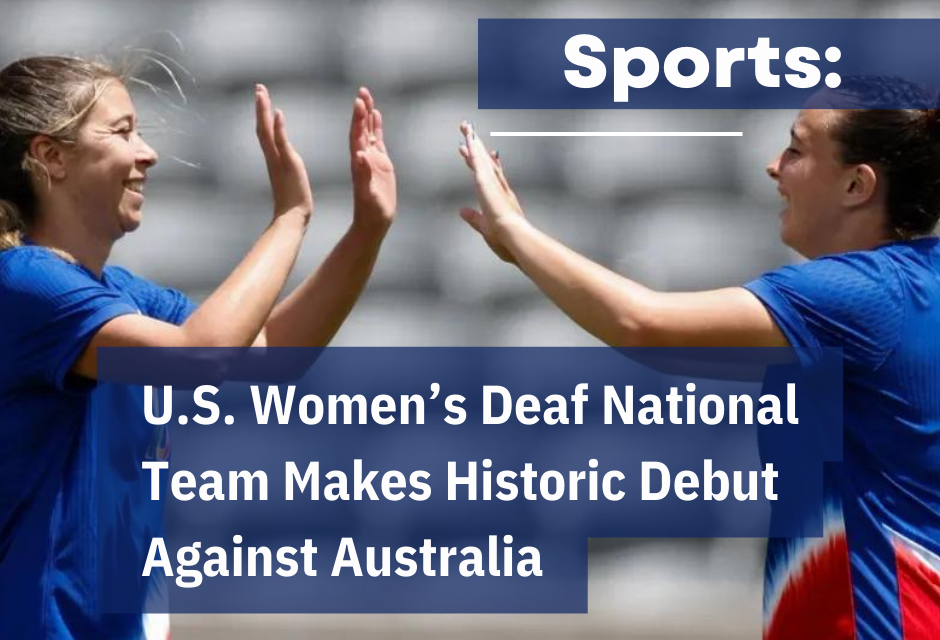On June 1, 2024, the U.S. Women’s Deaf National Team (WNT) made history by defeating Australia 11-0 in a groundbreaking doubleheader event with the U.S. Women’s National Team. This momentous match, held at Dick’s Sporting Goods Park in Commerce City, Colorado, marked the first time a game featuring one of the U.S. Soccer Federation’s Extended National Teams was broadcast live. This event serves as a milestone in sports broadcasting and a significant moment of recognition and inspiration for Deaf and hard-of-hearing athletes worldwide.
A Landmark Event
The match was a doubleheader with the U.S. Women’s National Team (USWNT) playing against the Korea Republic. Fans with tickets for the USWNT game were allowed to witness both matches, making it a day of celebration for women’s soccer in the United States. The event highlighted the excellence of the U.S. Women’s Deaf National Team, which has been a dominant force in international deaf sports. Since its inception in 2005, the team has won three Deaf International Football Association (DIFA) World Deaf Football Championships and four Deaflympics, amassing a formidable international record of 37-0-1 (Front Row Soccer).
Broadcast Milestone
Broadcasting the match live on truTV and Max represented a significant leap forward in visibility and awareness of Deaf sports. It allowed a broader audience to appreciate the skill and dedication of Deaf athletes, breaking down barriers and challenging stereotypes. This exposure is crucial for increasing the recognition and support for Deaf sports nationally and internationally.
Amy Griffin, head coach of the U.S. Women’s Deaf National Team and a member of the USA’s 1991 Women’s World Cup champions, emphasized the event’s significance. “The U.S. women’s deaf national team is honored to participate in this historic doubleheader with the U.S. women’s national team, and I know all the players are excited to participate in this unique event,” Griffin said. “This doubleheader and the broadcast of our game marks a huge step forward for the Extended National Teams program and will magnify what success looks like when more opportunities and access are provided to everyone” (Front Row Soccer).
Inspirational Impact
The success of the U.S. Women’s Deaf National Team serves as an inspiration to Deaf and hard-of-hearing communities, demonstrating what is possible with dedication, training, and support. The team’s achievements on the international stage showcase the potential of Deaf athletes and the importance of providing them with equal opportunities to compete and excel.
This historic match also underscores the broader need for inclusivity in sports. By showcasing the talents of Deaf athletes on a prominent platform, it encourages sports organizations and the general public to recognize and support the diverse abilities of all athletes. It also highlights the importance of accessible sports programs and facilities, which can foster the growth and development of athletes with disabilities from a young age.
The Road Ahead
The U.S. Women’s Deaf National Team’s preparation for this match included a training camp in Commerce City, leading up to the 2024 Deaf Pan American Games scheduled for November in Canoas, Brazil. This match against Australia was their first full international match on U.S. soil, further cementing their place in the annals of sports history and setting a precedent for future international engagements on home turf.
The historic match between the U.S. Women’s Deaf National Team and Australia marks a significant milestone in the journey towards inclusivity and recognition for Deaf athletes. By broadcasting the match live and showcasing the extraordinary talents of Deaf athletes, this event not only celebrates their achievements but also serves as a powerful catalyst for change. It calls for more opportunities, better access, and greater visibility for athletes with disabilities, inspiring future generations and setting a new standard for inclusivity in sports.
As we celebrate this historic event, we must continue advocating for equal opportunities and support for all athletes, regardless of their abilities. The U.S. Women’s Deaf National Team has shown us what is possible when barriers are broken down, and all athletes are given the chance to shine.






